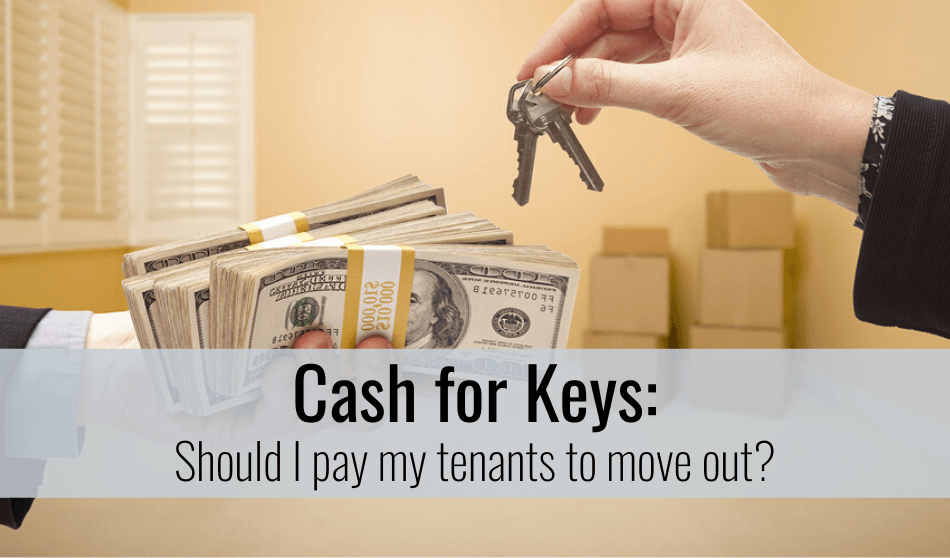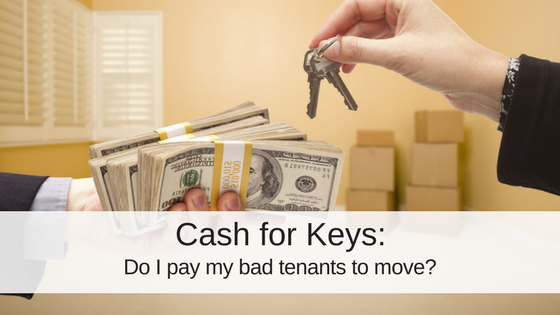 Would you rather pay for an eviction and potential property damage from a disgruntled tenant, or simply pay the problem tenant to just
Would you rather pay for an eviction and potential property damage from a disgruntled tenant, or simply pay the problem tenant to just disappear move out?
If you have a renter who stopped paying rent or is a nuisance to rent to, you might consider a cash for keys agreement to get them to leave. Cash for keys deals are also an option for landlords and rental property owners who want to see a delinquent tenant move out quickly.
Cash for keys is an agreement between an owner and a tenant for a renter to move out on an agreed-upon date in exchange for cash. Cash for key deals gained popularity during the Housing Crisis when banks offered cash for keys to occupants of foreclosed properties.
A cash for keys offer can also be an attractive solution to landlords who want responsible tenants to move out, so they can remodel the property, move-in themselves, or change the lease in order to increase the rent to market rate. When a landlord offers cash for keys to a tenant in a rent-controlled property in order to sell the property or increase the rent to market rate, it is typically referred to as a Buyout Agreement.
What is Cash for Keys?
Cash for keys provides an incentive for tenants who can no longer pay rent to move out by a certain date and then receive a cash reward from the landlord. It might seem counterintuitive to pay tenants who cannot pay rent, however, many investors are finding that the program actually costs less than filing fees, attorney fees and lack of rent payments during the eviction process, which can drag on for a month or longer.
Cash for keys gives you a way to entice your tenants to move and leave the rental property in good condition for money. Because the only legal way to remove tenants is via the eviction process, you might want to consider turning to a cash for keys incentive to get tenants to leave voluntarily. While it may seem expensive and the opposite of a landlord’s goals, getting unwanted tenants out quickly and peacefully can actually cost you less time and money than a formal eviction.
How much does a legal eviction cost?
The average cost of an eviction is $3,500, for all eviction-related expenses, according to a report from TransUnion. The analysis found that eviction-related expenses, which include maintenance fees, lost rent, court costs, filing costs and judgment costs, can reach as high as $10,000.
How long does a legal eviction take?
The formal eviction process is governed by your state’s landlord-tenant laws. An official eviction can take anywhere from a few weeks to a few months.
In most cases, evictions will require notice to the tenant, filing a court action against the tenant, and seeing the eviction through a lengthy eviction process that may require a hearing. Only if a judgment is ruled against your tenant, then can you obtain a writ of possession and work with a sheriff to legally remove the tenant. During that time, you can miss out on rental income and risk property damage from a tenant who has nothing to lose. How’s that cash for keys deal sounding now?
How much money should I offer in a Cash for Keys agreement?
According to the California Department of Real Estate, anecdotal reports from those who have had experience with “cash for keys” programs report that $500 is generally the minimum and $5,000 the maximum amount offered to tenants for their keys.
In some rent-stabilized markets, anecdotal accounts report property owners offering to pay tens of thousands of dollars to tenants in a cash for keys situation.
What if the tenant doesn’t move after a Cash for Keys deal was made?
Make sure that there is a legally enforceable right for you to evict the tenants should they not comply with the written cash for keys agreement. The cash for keys agreement should specify that the tenants understand that failure to comply means they waive their right to a trial and are giving up possession of the property. This way, you can get a writ of possession quickly in case they don’t move out after all. You should speak with an attorney to assist you in drafting up a legally binding cash for keys agreement.
Want something better than a cash for keys deal? The best way to avoid a potential eviction is to screen your tenants and only approve those applicants with a proven record to pay rent on time and follow lease terms. A tenant credit check, criminal background search, eviction history report, and a call to a renter’s previous landlords can help you find the most qualified renters.
Are cash for key deals legal?
It’s important to understand the landlord-tenant laws that pertain to you, your property, and your rental business. You must review your local city and county laws to know if you are legally allowed to make a cash for keys deal or offer a tenant buyout agreement. Landlords and property managers are never allowed to harass their tenants or residents. Your local laws will dictate how cash for keys deals can be offered, how much money can be offered, how discussion about the offer can be handled, and under what circumstances a cash for keys deal is permissible. You should consult a licensed attorney before making a cash for keys offer in order to protect yourself, your property and your tenants.







sure have. works like a charm!!!
I live in a rental unit owner wants to sell doesn’t want to fix anything that needs to be picked you’re like the heater so I put a code enforcement on him now and we’re going to see how that goes I would like him to pay me to get out because I want to get out from his slumlord guy man
I have done this for years. I go so far as to offer to pack them and move them with my trailer. I can tell when things are about to go south so I just go ahead and go talk about what’s going on. Most of mine had illness in family, job loss and were glad to get out. I’ve had them out in as little as three days. We bust our tails to pack and go. Never had to evict anyone yet in 15 years. But going in I make it clear that I’m not their friend, I don’t do people. I want their money and peace and quiet. ( I forgot to mention I live next door)
I don’t understand how this works
Hi Connie, Cash for Keys is an agreement between a landlord and a tenant where the landlord pays the tenant to move out of a property either before a lease agreement has ended or instead of processing an eviction. Neither landlord nor tenant can force the other to agree to cash for keys. It is simply an available option for both parties to consider. I hope that helps clarify the article.
Hi Heather, as an excellent renter/tenant with a new health issue, a friend turned in a 30-day notice in anticipation of a major medical procedure, but did not happen and she was going to let the landlord know she was rescinding her move; however, before that and a full 9-days AFTER they received her rent payment and notice, she received a cash for keys offer; now they are saying she is not eligible for the offer. Is there a amount of notice time a tenant should get for a cash for keys offer? Like 30-days at least?
Hi Carolyn,
I am seeing two distinctly different issues at hand. The first was the 30-day notice given. That notice is legally binding and I don’t believe there are any states that require a landlord to honor a request to rescind a move-out notice. Once the notice is given to the landlord, that landlord has every right to expect the tenant will move-out. In fact, the landlord may begin to market the unit, conduct a pre-move-out inspection, etc.
Secondly, a cash for keys offer is just that, an offer. The landlord may revoke that offer at anytime prior to a signed agreement. I don’t believe there are any notification time requirements.
I would recommend your friend review their lease agreement and reach out to their local housing authority if they have any questions on their rights and responsibilities.
Is the cash for keys money considered as income for the tenant and thus can be issued a 1099 Form? Has anyone done that, and if so, what results have you had with your tax preparer in issuing the 1099?
There seems to be information online about cash for keys in foreclosure cases but not much in way of rentals. I could imagine the cash for keys could fall under a loss of income, cancelation of debt, a business expense, or a combination of and I’m sure there are many other nuances. I can’t offer up legal advice but would be cautious relying on a tax preparer who isn’t a certified accountant versed in the rental housing industry.
My mother had to move into an assisted living facility because she needs 24 hour care. We need to sell her home to pay for ongoing expenses, however, she let her grandson move in. He later brought in a new girlfriend. Grandson, went to jail in January, so we asked the girlfriend to move out. She won’t and now is compromising my mother’s ability to pay for her critical care. What can we do?
This is a complex issue as the girlfriend may have established residency. I can’t offer legal advice but aside from offering cash for keys, you may need to go forward with an eviction or sell the home as-is, meaning tenant-occupied. I would suggest you contact your local housing authority to find out what notices you need to give her in relation to the activities for selling (home inspections, showing the home) and evictions. And of course, contact an attorney familiar with rental real estate law as they will help you navigate any legal issues for any of these three options.
This is currently being offered to me by the owner of the house I’ve been renting. My family has never given the owner of the home any problems and have paid our rent on time every month of our lease. She’s trying to cancel the final year of our lease because they are in a financial situation. Not trying to make it harder on the owner of the home but I have a family with a baby on a way so they have created an situation for ourselves. What are my options if I feel like the buyout is less than desirable given the situation. Not trying to be greedy but have to put my family first.
Glad to hear you are on such good terms with your landlord. Your situation is different and because you are on good terms, you may want to consider a counter request of an amount that would help you begin again in a new location. Although there is no guarantee, It never hurts to ask.
I just found out that I have to move out of the home that I have rented for over 15 years because she wants her house back. My husband and I have never broken the rules of our agreement and our rent is paid up to January. I have been battling cancer and have not been able to work for almost a year. I honestly don’t have the money to move and was wondering how I would be able to be able to do this if she hasn’t offered us anything to move?
I’m not certain if your agreement is a fixed-term lease or a month-to-month rental agreement by your comment but unfortunately, in most cases, if the landlord wants to occupy the home they can ask you to move (with proper notice) without compensation. If you are on a fixed-term lease (not a month to month agreement) then there might be some exceptions so I would recommend checking with your local housing authority.
the keys for cash cover one tenant or two
Interesting question — are you suggesting the landlord is renting out rooms separately or perhaps one tenant allowed multiple people to move in? My guess is that it really would come down to the exact situation, lease agreement (if any), and negotiations between the landlord and the occupants.
Help….. I sold my rental property and tenants said they could not move before escrow closed. I flat out told them that I was not going to pay cash for keys. I would rather wait until they moved. Buyer did not want to wait…. they wanted to close because they were going to lose their interest rate. With this said,,,,,, we closed. When we closed we put 5K in escrow in the event they need to evict. Well new landlord offer cash for keys and said the was part of the eviction. Is cash for keys part of an eviction? Should my realtor be the one following up?
Hi Alma, cash for keys is an alternative to eviction. It’s an offer so that an eviction can be avoided. Typically, the new homeowner becomes the landlord and assumes all leases, rental agreements, when they take ownership. From my understanding, it would be up to them to how to proceed to work to have the tenant removed. Having said that, you might have some other conditions and caveats (like the $5k in escrow) as part of the sales agreement that I’m not aware of — as that is a legal concern that I’m not qualified to speak to, I would contact the realtor and your real estate attorney to discuss.
Can you explain what does exact mean of cash for keys?
If I’m right, you mean to say a property owner offer money to the tenant for expelling the property.
Thanks for the question, Toby. You are correct, as the article suggests, it is an alternative to a very lengthy and expensive eviction process that benefits both the occupant and the landlord.
Can moving expenses be used to offset cash for keys income?
Hi Wayne, Can you provide a little bit more clarification on what you mean? I’m not sure I fully understand your question.